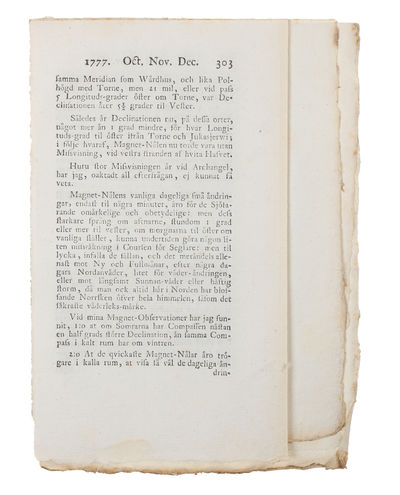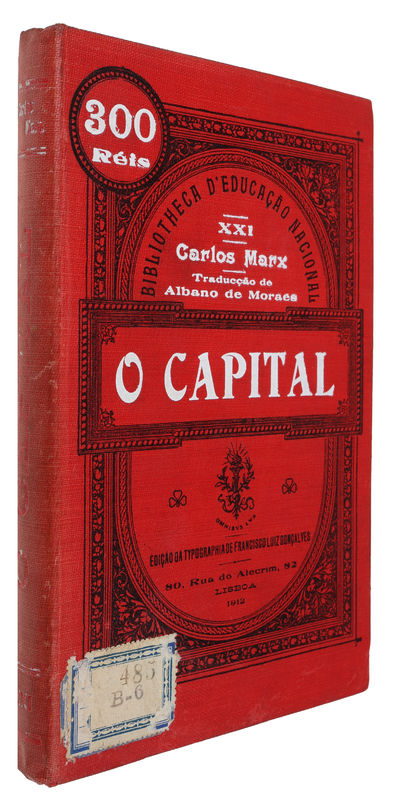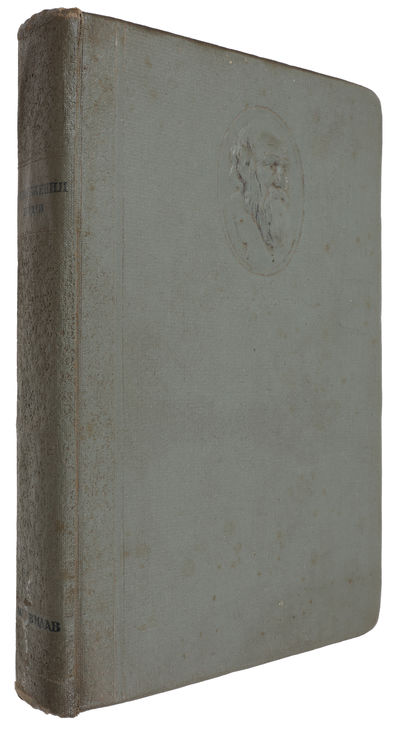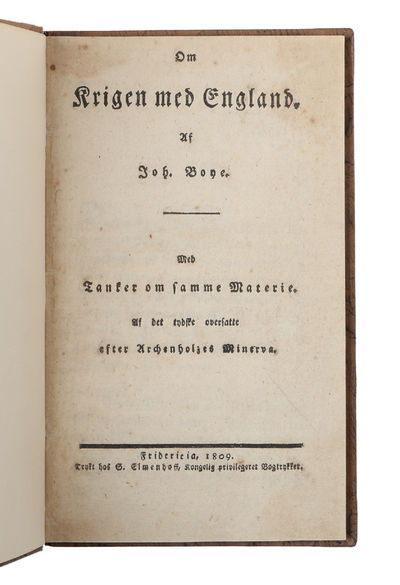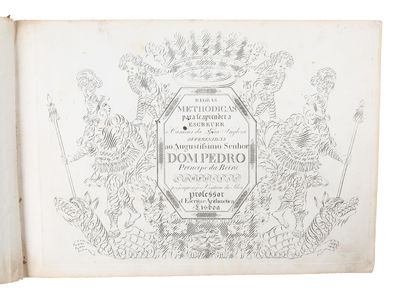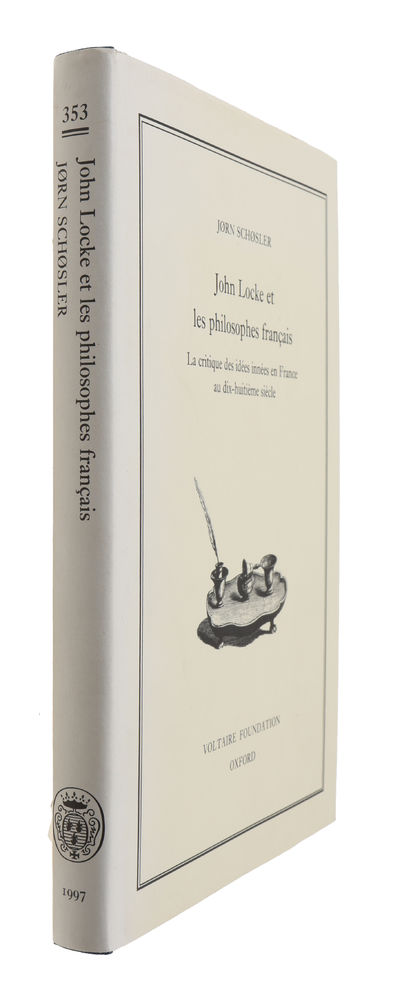MACHIAVELLI.
Machiavels Prins, med Undersökningen deraf. Öfversatt ifrån Hufvudspråken. - [THE FIRST SCANDINAVIAN EDITION OF "THE PRINCE" - POSSIBLY THE RAREST MACHIAVELLI-TRANSLATION]
Herman H. J. Lynge & Søn A/S
lyn56106
Stockholm, Grefing, 1757. Small 8vo. In the original blank wrappers. Dampstain to upper part of spine and upper part of back wrapper, affecting last blank leaf. Old owner's name to title-page. First blank leaf with comments in recent hand in pencil. From the library of Swedish crime author Henning Mankell. Text printed in two columns. Title-page with lovely engraved vignette, depicting a putti with a spyglass (symbolising the Enlightenment) and lovely woodcut vignettes. Untouched and unrestored in completely original condition. A magnificent copy. (16), 256 pp.
Exceedingly scarce first edition of the first Scandinavian translation of Machiavelli's "Il Principe", namely the first Swedish translation. Through its Scandinavian translation, the work came to have an immense impact on Scandinavian politics and philosophy and was considered a breakthrough work of political thought, albeit highly controversial and not at all acceptable at the time. Even though antedating some other European versions by more than two centuries, the first translation into a Nordic language came to signify substantial changes in the political climate of the Nordic countries and sparked a debate that was to last another century, until Machavelli was finally accepted in the North. ""The Prince" was not to be translated in Scandinavia until more than two centuries later, partly because in the meantime it could be read in Latin - in the versions of Tegli, Conring and Langenhert - and later in French, but also because at that time a work which established, among other things, the superiority of the Reason of State to moral values was unacceptable, at least formally. The first translation of "The Prince" into a Nordic language is by Carl von Klingenberg, together with the translation of "The Anti-Machiavel" by Frederick II of Prussia ("Machiavels Prins, med Undersökningen deraf. Öfversatt ifrån Hufvudspråken", Grefing 1757).Klingenberg's work, however, remained an isolated fact for more than a century. Actually "The Prince" as a separate work, was translated only in 1867 by Rudolf August Helfrid Afzelius…; by that time the debate over Machiavelli had been settled, and the value of "The Prince" finally Acknowledged... The first Danish translation of the whole work dates back to only 1876...Therefore the first Scandinavian translation of "The Prince" was completed in Sweden around the middle of the eighteenth century, during the "frihetstid" (The "Age of Liberty", 1721-72), a period full of political, social and cultural turmoil: These are the years of the making of a political conscience and of the spread of new political theories, of the development of rhetoric, of the foundation of reviews and literary associations, as well as of scientific and cultural academies; these years marked a new openness to foreign cultures and the diffusion of Enlightenment ideas. The "Age of Liberty" is also a period full of political and cultural conflicts and uncertainty." (Roberto de Pol, pp. 248-250). "The Prince" constitutes the beginning of modern political philosophy and one of the most influential works in the history of modern thought. It founded the science of modern politics on the study of mankind, and even today no political thinker can disregard the importance of this masterpiece of political theory. For more information about the first Scandinavian translation and about the translator, see: Roberto de Pol: The First Translations of Machiavelli's "Prince", pp. (247-278). The work is of the utmost scarcity and we have been able to locate no more than three copies of it world-wide: 1: National Library of Sweden; 2: National Library of Denmark; 3: Brown University (the Machiavelli Collection). This makes it one if the very scarcest Machiavelli-translations in the world.
Exceedingly scarce first edition of the first Scandinavian translation of Machiavelli's "Il Principe", namely the first Swedish translation. Through its Scandinavian translation, the work came to have an immense impact on Scandinavian politics and philosophy and was considered a breakthrough work of political thought, albeit highly controversial and not at all acceptable at the time. Even though antedating some other European versions by more than two centuries, the first translation into a Nordic language came to signify substantial changes in the political climate of the Nordic countries and sparked a debate that was to last another century, until Machavelli was finally accepted in the North. ""The Prince" was not to be translated in Scandinavia until more than two centuries later, partly because in the meantime it could be read in Latin - in the versions of Tegli, Conring and Langenhert - and later in French, but also because at that time a work which established, among other things, the superiority of the Reason of State to moral values was unacceptable, at least formally. The first translation of "The Prince" into a Nordic language is by Carl von Klingenberg, together with the translation of "The Anti-Machiavel" by Frederick II of Prussia ("Machiavels Prins, med Undersökningen deraf. Öfversatt ifrån Hufvudspråken", Grefing 1757).Klingenberg's work, however, remained an isolated fact for more than a century. Actually "The Prince" as a separate work, was translated only in 1867 by Rudolf August Helfrid Afzelius…; by that time the debate over Machiavelli had been settled, and the value of "The Prince" finally Acknowledged... The first Danish translation of the whole work dates back to only 1876...Therefore the first Scandinavian translation of "The Prince" was completed in Sweden around the middle of the eighteenth century, during the "frihetstid" (The "Age of Liberty", 1721-72), a period full of political, social and cultural turmoil: These are the years of the making of a political conscience and of the spread of new political theories, of the development of rhetoric, of the foundation of reviews and literary associations, as well as of scientific and cultural academies; these years marked a new openness to foreign cultures and the diffusion of Enlightenment ideas. The "Age of Liberty" is also a period full of political and cultural conflicts and uncertainty." (Roberto de Pol, pp. 248-250). "The Prince" constitutes the beginning of modern political philosophy and one of the most influential works in the history of modern thought. It founded the science of modern politics on the study of mankind, and even today no political thinker can disregard the importance of this masterpiece of political theory. For more information about the first Scandinavian translation and about the translator, see: Roberto de Pol: The First Translations of Machiavelli's "Prince", pp. (247-278). The work is of the utmost scarcity and we have been able to locate no more than three copies of it world-wide: 1: National Library of Sweden; 2: National Library of Denmark; 3: Brown University (the Machiavelli Collection). This makes it one if the very scarcest Machiavelli-translations in the world.
Adresse:
Silkegade 11
DK-1113 Copenhagen Denmark
Telefon:
CVR/VAT:
DK 16 89 50 16
Email:
Web:
![Machiavels Prins, med Undersökningen deraf. Öfversatt ifrån Hufvudspråken. - [THE FIRST SCANDINAVIAN EDITION OF "THE PRINCE" - POSSIBLY THE RAREST MACHIAVELLI-TRANSLATION] (photo 1)](https://d3525k1ryd2155.cloudfront.net/h/504/820/1160820504.0.l.jpg)
![Machiavels Prins, med Undersökningen deraf. Öfversatt ifrån Hufvudspråken. - [THE FIRST SCANDINAVIAN EDITION OF "THE PRINCE" - POSSIBLY THE RAREST MACHIAVELLI-TRANSLATION] (photo 2)](https://d3525k1ryd2155.cloudfront.net/h/504/820/1160820504.1.l.0.jpg)
![Machiavels Prins, med Undersökningen deraf. Öfversatt ifrån Hufvudspråken. - [THE FIRST SCANDINAVIAN EDITION OF "THE PRINCE" - POSSIBLY THE RAREST MACHIAVELLI-TRANSLATION] (photo 3)](https://d3525k1ryd2155.cloudfront.net/h/504/820/1160820504.2.l.0.jpg)
![Machiavels Prins, med Undersökningen deraf. Öfversatt ifrån Hufvudspråken. - [THE FIRST SCANDINAVIAN EDITION OF "THE PRINCE" - POSSIBLY THE RAREST MACHIAVELLI-TRANSLATION] (photo 4)](https://d3525k1ryd2155.cloudfront.net/h/504/820/1160820504.3.l.0.jpg)
![Machiavels Prins, med Undersökningen deraf. Öfversatt ifrån Hufvudspråken. - [THE FIRST SCANDINAVIAN EDITION OF "THE PRINCE" - POSSIBLY THE RAREST MACHIAVELLI-TRANSLATION] (photo 5)](https://d3525k1ryd2155.cloudfront.net/h/504/820/1160820504.4.l.0.jpg)
![Machiavels Prins, med Undersökningen deraf. Öfversatt ifrån Hufvudspråken. - [THE FIRST SCANDINAVIAN EDITION OF "THE PRINCE" - POSSIBLY THE RAREST MACHIAVELLI-TRANSLATION] (photo 6)](https://d3525k1ryd2155.cloudfront.net/h/504/820/1160820504.5.l.0.jpg)
![Machiavels Prins, med Undersökningen deraf. Öfversatt ifrån Hufvudspråken. - [THE FIRST SCANDINAVIAN EDITION OF "THE PRINCE" - POSSIBLY THE RAREST MACHIAVELLI-TRANSLATION] (photo 7)](https://d3525k1ryd2155.cloudfront.net/h/504/820/1160820504.6.l.0.jpg)
